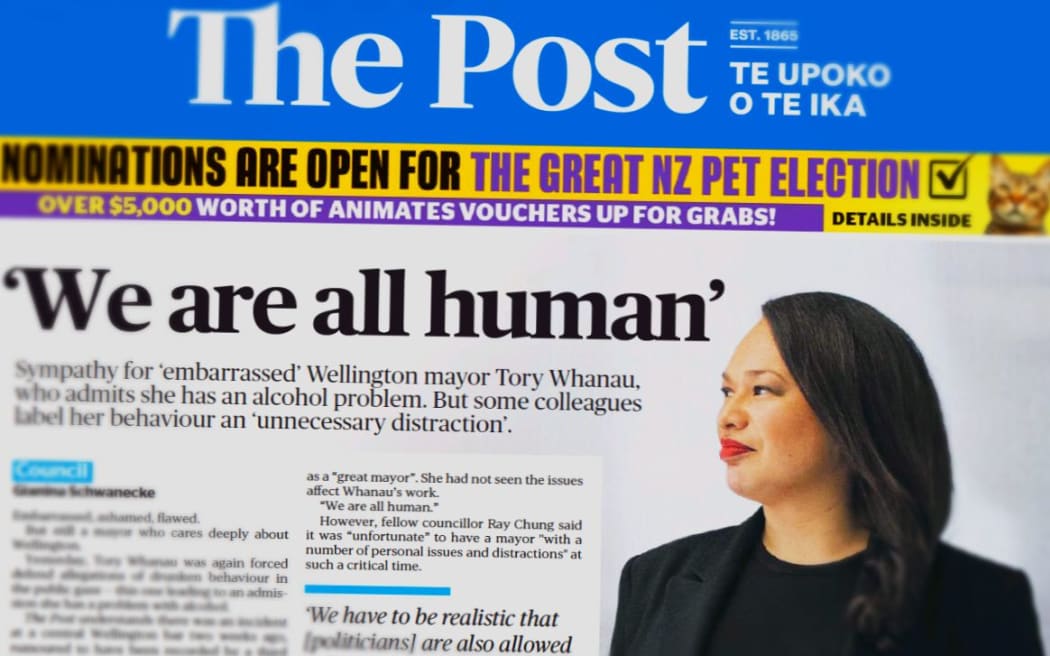They're pilots, CEOs, teachers, doctors - and mayors. High functioning alcoholics whose behaviour hasn't yet tipped over into disaster, which one recovering addict describes as 'leading a double life'.

Tory Whanau on the front page of The Post last Thursday. Photo: The Post
Wellington mayor Tory Whanau's admission that she has a drinking problem is another new headline for a not-so-new issue.
The New Zealand Health Survey says that 4 in 5 Kiwi adults have had a drink in the past year, and 1 in 5 have a hazardous drinking pattern. So why is there so much stigma attached to something that's so widespread?
In today's episode of The Detail we discuss alcohol, alcoholism, and our reluctance to accept someone who finally accepts they have a problem.
Janet Thompson has experienced that stigma first hand. She tells Wilhelmina Shrimpton her problematic drinking started later in life, as a CEO in her early 40s.
"I think the stigma exists because people don't understand it's a disease. So people look at the alcoholic with a kind of revulsion and contempt, and kind of say, just get your act together," she says.
"My difficulty with alcohol came when I had everything that I thought I ever wanted in life. So I had a child, I had great friends, I had great family, I had a great job, I had no financial worries. But it just wasn't enough, I had this emptiness that I couldn't describe."
She says if she wasn't drinking, she was thinking about drinking, and describes the balance between being a CEO and an alcoholic as "leading a double life."
"On the outside I was this high performing, high functioning successful person. On the inside, I just felt like a piece of sh*t."
She says she often hears stories like hers at the Warkworth based rehab centre she runs called The Retreat, and says situations like Tory Whanau's are not uncommon.
"We have bank managers, pilots, doctors, nurses. We have very high profile and very successful people come in."
But Thompson wants to see people offered help before it becomes a problem, rather than afterwards.
"I would love to see workplaces put their hand up and say we're actually a recovery-friendly workplace. So if you're struggling with alcohol or drugs, and it hasn't affected your performance, but you feel like it might, it's okay to put your hand up, and we will deal with it as a health issue."
Alcohol Healthwatch Executive Director Andrew Galloway says right now, booze is deeply engrained in New Zealand's culture.
So what are we doing to protect kiwis - and particularly those prone to addiction?
The Sale and Supply of Alcohol Act 2012 was introduced as a tool to ensure "safe and responsible sale, supply, and consumption" ... but Andrew tells The Detail it's fast becoming out of date.
"We'd be really keen to support a review of the legal framework again, as it's been over 10 years. Since then, we've had a rapid growth and COVID has seen a change in whole lot of behaviours. More people are working from home, but we also saw in the alcohol space quite concerningly a massive growth in rapid delivery.
"It's scary, because it was only 2012. It's not a long time to have a piece of legislation that is suddenly out of date."
He also says alcohol policy has also become a tough balancing act between the positive outcomes for our economy ... and the negative outcomes for our health.
"I will say that alcohol does provide a huge source of employment and there are some positives. People like it, and over 80 percent of New Zealanders drink, and we associate it with celebrating."
"However, alcohol consumption is a component cause for over 200 diseases and injury conditions. And in 2007, it was estimated 800 deaths could be attributed to alcohol. So you know, it's a big cost to society."
Check out how to listen to and follow The Detail here.
You can also stay up-to-date by liking us on Facebook or following us on Twitter.

Photo:


